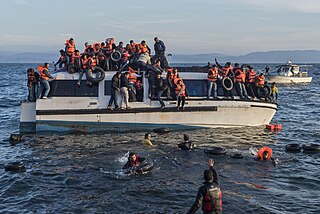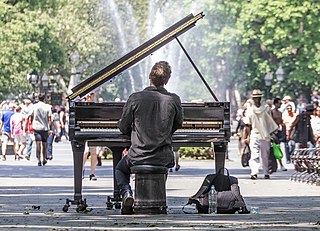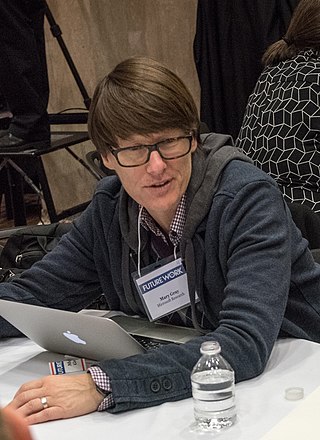
Gentrification is the process of changing the character of a neighborhood through the influx of more affluent residents and investment. There is no agreed-upon definition of gentrification. In public discourse, it has been used to describe a wide array of phenomena, usually in a pejorative connotation.

Beardstown is a city in Cass County, Illinois, United States. The population was 5,951 at the 2020 census. The public schools are in Beardstown Community Unit School District 15.

Human migration is the movement of people from one place to another, with intentions of settling, permanently or temporarily, at a new location. The movement often occurs over long distances and from one country to another, but internal migration is the dominant form of human migration globally.
Social history, often called "history from below", is a field of history that looks at the lived experience of the past. Historians who write social history are called social historians. Social history came to prominence in the 1960s, with some arguing that its origins lie over a century earlier.

Forced displacement is an involuntary or coerced movement of a person or people away from their home or home region. The UNHCR defines 'forced displacement' as follows: displaced "as a result of persecution, conflict, generalized violence or human rights violations".
Glocalization or glocalisation is the "simultaneous occurrence of both universalizing and particularizing tendencies in contemporary social, political, and economic systems". The concept comes from the Japanese word dochakuka and "represents a challenge to simplistic conceptions of globalization processes as linear expansions of territorial scales. Glocalization indicates that the growing importance of continental and global levels is occurring together with the increasing salience of local and regional levels."

Intersectionality is a sociological analytical framework for understanding how groups' and individuals' social and political identities result in unique combinations of discrimination and privilege. Examples of these factors include gender, caste, sex, race, ethnicity, class, sexuality, religion, disability, height, age, weight and physical appearance. These intersecting and overlapping social identities may be both empowering and oppressing. However, little good-quality quantitative research has been done to support or undermine the practical uses of intersectionality.
Transnationalism is a research field and social phenomenon grown out of the heightened interconnectivity between people and the receding economic and social significance of boundaries among nation states.
Transnational feminism refers to both a contemporary feminist paradigm and the corresponding activist movement. Both the theories and activist practices are concerned with how globalization and capitalism affect people across nations, races, genders, classes, and sexualities. This movement asks to critique the ideologies of traditional white, classist, western models of feminist practices from an intersectional approach and how these connect with labor, theoretical applications, and analytical practice on a geopolitical scale.

Placemaking is a multi-faceted approach to the planning, design and management of public spaces. Placemaking capitalizes on a local community's assets, inspiration, and potential, with the intention of creating public spaces that improve urban vitality and promote people's health, happiness, and well-being. It is political due to the nature of place identity. Placemaking is both a process and a philosophy that makes use of urban design principles. It can be either official and government led, or community driven grassroots tactical urbanism, such as extending sidewalks with chalk, paint, and planters, or open streets events such as Bogotá, Colombia's Ciclovía. Good placemaking makes use of underutilized space to enhance the urban experience at the pedestrian scale to build habits of locals.

Immigration is the international movement of people to a destination country of which they are not usual residents or where they do not possess nationality in order to settle as permanent residents. Commuters, tourists, and other short-term stays in a destination country do not fall under the definition of immigration or migration; seasonal labour immigration is sometimes included, however.
Internal migration in the People's Republic of China is one of the most extensive in the world according to the International Labour Organization. This is because migrants in China are commonly members of a floating population, which refers primarily to migrants in China without local household registration status through the Chinese Hukou system. In general, rural-urban migrant most excluded from local educational resources, citywide social welfare programs and many jobs because of their lack of hukou status. Migrant workers are not necessarily rural workers; they can simply be people living in urban areas with rural household registration.
Aneesh Aneesh is a sociologist of globalization, labor, and technology. He is Executive Director of the School of Global Studies and Languages at the University of Oregon and a Professor of Global Studies and Sociology. Previously, he served as a professor of sociology and director of the Institute of World Affairs and the global studies program at the University of Wisconsin, Milwaukee. In the early 2000s, he taught in the science and technology program at Stanford University and formulated a theory of algocracy, distinguishing it from bureaucratic, market, and surveillance-based governance systems, pioneering the field of algorithmic governance in the social sciences. Author of Virtual Migration: The Programming of Globalization and Neutral Accent: How Language, Labor and Life Become Global, Aneesh is currently completing a manuscript on the rise of what he calls modular citizenship.

Ananya Roy is a scholar of international development and global urbanism. Born in Calcutta, India (1970), Roy is Professor and Meyer and Renee Luskin Chair in Inequality and Democracy at the UCLA Luskin School of Public Affairs. She has been a professor of City and Regional Planning and Distinguished Chair in Global Poverty and Practice at the University of California, Berkeley. She holds a Bachelor of Comparative Urban Studies (1992) degree from Mills College, and Master of City Planning (1994) and Doctor of Philosophy (1999) degrees from the Department of City and Regional Planning at the University of California at Berkeley.

Aihwa Ong is a professor of anthropology at the University of California, Berkeley, a member of the Science Council of the International Panel on Social Progress, and a former recipient of a MacArthur Fellowship for the study of sovereignty and citizenship. She is well known for her interdisciplinary approach in investigations of globalization, modernity, and citizenship from Southeast Asia and China to the Pacific Northwest of the United States. Her notions of 'flexible citizenship', 'graduated sovereignty,' and 'global assemblages' have widely impacted conceptions of the global in modernity across the social sciences and humanities. She is specifically interested in the connection and links between an array of social sciences such as; sociocultural anthropology, urban studies, and science and technology studies, as well as medicine and the arts.

Mary L. Gray is an American anthropologist and author. She is a Fellow at Harvard University's Berkman Klein Center for Internet and Society, as well as a Senior Principal Researcher at Microsoft Research. Along with her research, Gray teaches at Indiana University, maintaining an appointment as an Associate Professor of the Media School, with affiliations in American Studies, Anthropology, and Gender Studies. In 2020, she was awarded a MacArthur Genius Grant in recognition of her work "investigating the ways in which labor, identity, and human rights are transformed by the digital economy."

Transnational psychology is a branch of psychology that applies postcolonial, context-sensitive cultural psychology, and transnational feminist lenses to the field of psychology to study, understand, and address the impact of colonization, imperialism, and globalization, and to counter the Western bias in the field of psychology. Transnational psychologists partner with members of local communities to examine the unique psychological characteristics of groups without regard to nation-state boundaries.

Patricia Fernández-Kelly is a social anthropologist, academic and researcher. She is Professor of Sociology and Research Associate at the Office of Population Research at Princeton University. She is also the director of the Princeton Center for Migration and Development, associate director of the Program in American Studies, and Chair of the Board at the Latin American Legal Defense and Education Fund (LALDEF).
David Howard Kaplan is an American geographer, academic, and author. He is a professor of geography at Kent State University.
Faranak Miraftab is an Iranian-American urban scholar and is currently a professor of Urban and Regional Planning at the University of Illinois Urbana-Champaign. She is known for her works on urban planning and development. She is a winner of Davidoff Book Award and American Sociological Association's Global & Transnational Sociology section Book Award and a finalist in C. Wright Mills Book Award for her book Global Heartland: Displaced Labor, Transnational Lives and Local Placemaking.












